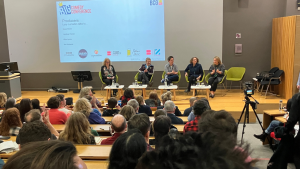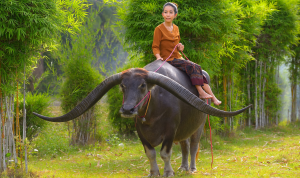 And learning how to transition from research to pre-writing to writing.
And learning how to transition from research to pre-writing to writing.
Yesterday, I published an update on my new sitcom, Fieldwork, where I compared the writing process for my unnamed and now trunked pandemic disaster novel (which I’ll just call Pandemic for now) and the process I’m going through with Fieldwork. Both stories are based on real science, but for Pandemic I just didn’t know how to stop doing the reading and start doing the writing so I got stuck doing research for far longer than I should have. As I said in that post:
I spent two years reading everything I could about the Spanish Flu, bird flu, vaccine development and manufacturing, PPE and all that. And I was just coming up to the finishing line when Covid hit, making pretty much everything I’d written obsolete. Had I started writing in 2015 instead, and researched what I needed as I went a long, I’d have likely finished it long before the pandemic made it impossible to publish.
My problem back then was that disaster lit was a new genre for me, and I was unsure whether it was really ‘for me’. It was easier to keep researching than to start the challenging task of writing and finding out the hard way whether I was any good at that kind of fiction. Worse, at that point I didn’t have a framework for doing ‘pre-writing’ — the world building, plot and character development work that needs to be in place before you start actually writing.
What’s interesting looking back is that I didn’t know I was blocked when I was blocked. I just thought I was being thorough and learning everything I could in order to give me good, solid foundations. But I didn’t use most of that research. Nothing about the use of eggs during vaccine manufacturing or the predicted shortage of eggs during mass vaccine production made it into the novel because my timeline didn’t include vaccine development. None of the reading I did on zoonosis, bird flu in poorly managed commercial flocks in China, the 2005 H5N1 outbreak at China’s Lake Qinghai, or how flu mutates was worth the paper it was printed out on when it came to writing.
They only reason that my extensive reading around the 1918 Spanish Flu outbreak was useful was that I discovered that my husband’s grandfather, James Kirkpatrick, had been a driver for the doctors at Camp Grant when the Spanish Flu arrived. The outbreak was so bad that the camp commander, Colonel Charles Hagadorn, shot himself. That gave us some insight into what James must have been through, but it was of no use for the novel.
All that work felt essential at the time, but it was just me putting off the act of starting to write. In large part, that was because I didn’t have any sort of pre-writing framework. I was seeking an inspirational jumping-off point that would push me straight into the beginning of my first draft but, not finding it, I just carried on reading.
Fieldwork has been very different. The research window was limited to four months and I transitioned fairly seamlessly, if you ignore the break to do Ada Lovelace Day, into pre-writing. Soon, I’ll start properly writing. It will be about a year from starting work to handing in a draft, the fastest I’ve done anything, except a novella.
I have now developed a practical, useful framework for these three phases of writing:
Stage 1: Research
Not every book needs research, but if you are writing something that’s based on reality then you probably do need to do a bit of reading. Crime writers need to understand forensics, for example, and historical fiction writers need to know about their chosen period. But before you start, determine the minimum viable amount of research required before you can start pre-writing. Then halve it.
With Pandemic, my research period was long and open-ended. I didn’t really know what I was looking for, so I kept going in the hope that I’d recognise the important information when I saw it. I did not. Instead, all that reading just piled up and up and up, clogging my brain with useless cruft.
With Fieldwork, I knew that I was looking for just two things: Funny anecdotes about fieldwork fails, and two or three research projects to give to my characters. I’d initially hoped to do a couple of dozen interviews, but in the end I did ten and that was plenty.
So plan your research before you start and put a hard deadline on it. You really don’t need to know everything up front and if you need to fill in the holes during pre-writing or writing, you can do that.
Stage 2: Pre-writing
Pre-writing is all that thinking you do before you start writing your story: World building, character development, relationship explorations, plotting, test dialogue, etc.
Some writers like to skip all this stuff and dive in at the deep end, but I think even the most avid of pantsters could benefit from a bit of pre-writing, which absolutely does not have to include outlining. And hardcore planners could probably do well to add more variety to their pre-writing in order to keep it fresh and interesting.
Your pre-writing should draw from your research (otherwise, why did you do it?) and prepare you for writing. For me, the key parts of pre-writing are:
- Character development: Who are these people? What kind of personalities do they have? How do they react in different situations?
- Relationship development: How do these characters respond to one another? Do they like each other? Hate each other? How do they react to each other when they are put under stress? How might their relationship change over the course of the story?
- Context: Where do these people find themselves, geographically speaking, when the story starts? Where are they when it ends? What is their situation, and how does it affect them? How does it change?
- Test dialogue: How do these people speak? How do they talk to one another when they first meet? How do they sound different on the page when they are speaking?
- World building: What are the rules of the world? Does it have different physics? Magic? Social rules? Legal rules? Plants, animals, ecosystems? Do not get sucked into this bit just because it’s fun. Keep it to the barest of minimums.
- Plotting: Just the major plot points in the right order. Not too detailed because that way madness lies. And boredom.
Everyone’s pre-writing needs are different and, as with research, you don’t want to overdo it. You need to get to a point where you feel that writing is possible, but not wait so long that you lose enthusiasm or allow starting writing to feel intimidating.
Stage 3: Writing
There have been more pixels spilt on the art of writing than I care to imagine and I have nothing new to say about it. You’ve all got the books.
But writing isn’t just writing. There will be times when you have to hop back and do a bit of research. Remember those holes I said you could fill? You’ll get to a point where you need a bit of info, and I recommend Cory Doctorow’s tactic of putting ‘TK’ where that bit of info should go and carrying on writing. You then have a research session later where look up all those facts and fill in those gaps, having preserved your earlier writing momentum.
(I actually use TKTK, which doesn’t naturally occur in the English language, because TK does exist in a few words like catkin and wicketkeeper.)
Equally, you might have to go back and do a bit more pre-writing. I’ll be doing this with Tag when I pick that back up, because I didn’t do it properly first time round and I have realised that some of my characterisation is a bit muddy. I’ll also do it with Pandemic if I ever go back to that, because I didn’t do any pre-writing for that novel at all, I just leapt straight into the writing and it shows.
So much of writing is actually figuring out what works for you. If ever there was a mantra for writing advice, it’s “Take what you need and leave the rest”. So if any of the above helps, let me know. And if you have any additional advice for other readers, please leave a comment.
{ Comments on this entry are closed }











